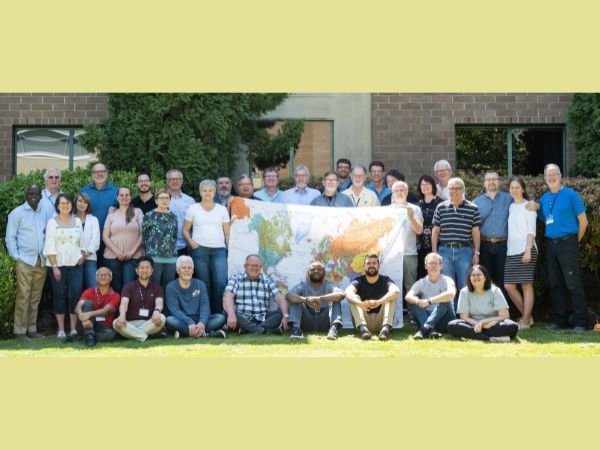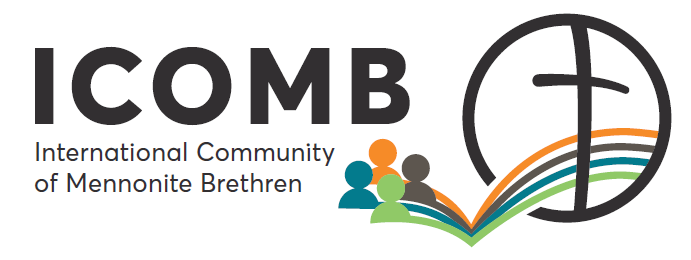Running the race
ICOMB 2023 Summit report
This year’s summit of the International Community of Mennonite Brethren Churches (ICOMB), hosted in Abbotsford, B.C., Canada, provided delegates a unique opportunity to experience the rich Mennonite Brethren heritage in that region of Canada. With churches dating back to 1929, a Bible college founded in 1943 and a Mennonite Heritage Museum with exhibits spanning 500 years of Anabaptist history, there was a palpable sense of being surrounded by “a great cloud of witnesses” encouraging believers to “throw off everything that hinders and the sin that so easily entangles” and “run with perseverance the race marked out for us…” (Hebrews 12:1).
Running has not been easy this last year.
As global MB pastors and leaders are aging out, they are looking to pass the baton to the next generation without slackening their pace. However, with fewer and fewer young leaders stepping up, that pace can be exhausting. In some cases, a lack of prospective leaders is exacerbated by the loss of existing church pastors who – emotionally depleted by three years of social unrest, political instability, financial hardship, culture wars, gender issues and COVID-19 devastation–simply quit.
“The pastor is expected to be everything, fix everything,” one delegate said. “Then, when something goes wrong, we are blamed for everything!”
“I am old, ready to retire,” another said. “But if one of our churches loses its pastor, what else can I do but step in?”
This was a common sentiment spoken by many, including delegates from Japan, Lithuania, Germany, Portugal, the USA and Canada. This race is no sprint; it is a marathon, and some have grown weary.
USMB national director Don Morris said: “This summit is a mixture of joy and sadness, abundant fruit and scarcity, praise and petition. But, we cannot afford to get too focused on our own little part of God’s kingdom work and forget that there are movements happening in many, many places.”
Raw self-examination and assessment must lead, not to despair, but to a rolling up of metaphorical sleeves. And so, despite the gravity of the concerns expressed, faces were far from grim. Rather, they grew animated and eager.
There was work to be done.
With a spiritual resolve that did credit to the ancestral brethren that had once plowed the very ground upon which they now stood, delegates dismissed from the plenary sessions headed to their workshops ready to explore new ideas, ruthlessly self-evaluate, strategize together and pray outrageous prayers. Each workshop was targeted, provoking spirited conversations on topics such as leadership development, pastoral health, and collaboration. Ideas came thick and fast as various models for church growth and health were discussed.
“In Saskatchewan, rural churches are dying,” said a provincial conference representative, “but instead of shutting them down, we are finding ways to re-plant them.” He went on to describe an SKMB church revitalization initiative that connects struggling churches with healthy partner churches, working together to discern the spiritual vitality and cultural issues that need to be addressed to thrive again. “It takes time,” he said, “…but we are seeing some significant results in remote rural communities.”
Could this strategy work in other global contexts?
Would such a partnership be too costly?
There was much debate about the risks involved. Pondering the Parable of the Talents, there was a realization that risk taken for God would always bear fruit, but it might not be the fruit that benefits us personally.
“One of our churches was not doing well,” an Austrian delegate said. “They had a large cargo van. It was no longer being used, since there were no people to fill it anymore! But rather than sell it to help with debt, they decided to fill it with supplies and drive it to Ukraine. Now, that van is being used daily by our brothers there, transporting refugees and bringing emergency relief.” Out of the ashes, beauty.
Other groups focused on the issue of pastors facing burn-out. How could a conference stem the tide of leaders leaving the ministry?
In Brazil, small, intentional support groups have helped more than 400 pastors regain emotional and spiritual health, while training them to do the same for their own congregants. “New leaders are now stepping up,” said Paul Dück, “when they see how we care for one another.” No one should have to run this race alone.
Then there were stories of those who were running together, and are running well.
In Malawi, conference leader Safari Mutabeshi passed his role to Shadreck Kwendanyama and team, leaving Safari free to focus more on DR Congo, his place of origin. “Despite drought, famine, hurricanes, cholera and poverty,” Safari said, “the churches are growing, with over 20,000 attending in Malawi!”
The Brazilian conference agreed to come alongside the conference in Angola, supporting Daniel Canganguela in discerning next steps. And in the US, 12 churches of Congolese immigrants were welcomed into the MB family, with more being discerned. Collaboration was crucial.
A collaborative approach to church growth involves, for some, “revitalization” through a strong partner church. For others, it is a “coalition partnership” between a global church, a national leader and a North American church.
For still others, church growth may require several groups of partner churches, called “sponsors.” Victor Wiens, Equipping Coordinator for ICOMB, told of the encouraging but daunting number of emerging church networks expressing interest in joining the global MB family, including groups from Bolivia, Dominican Republic, Kyrgyzstan, Mozambique, North Africa, Turkey, Sri Lanka, Uganda and Myanmar.
“These are new groups that have come into our orbit in one way or another,” Vic Wens said. Vic Wiens proposed that smaller groupings of churches (regional conferences, ethnic associations, etc.) be authorized and blessed to serve as sponsors for these fledgling groups that are seeking to join the MB family.
“Pace is critically important,” Rudi Plett said. “In some places we are stuck, but in others we are changing much too quickly. Mission needs to move at a pace which churches and conferences can sustain, or they will burn out.” Change is both disruptive and inevitable; it must also be intentional and measured.
Change also took place during the summit at the executive level, as a new board was put forward for the next term. Executive Director Rudi Plett, having completed six years of service from his base in Paraguay, also formally proposed Canadian executive director Elton DaSilva as his successor. This was met with overwhelming approval, and Elton has since agreed to accept this role.
Due to difficulties in obtaining Canadian entry visas, various global delegates were unable to attend the summit in person, but made their presence felt via video conferencing. These were poignant moments, where their physical absence was keenly felt by all.
Expressions of brotherly affection – both in person and virtual – increased throughout the week, as new commonalities of blessing and challenge were discovered almost daily. There were times when these discoveries left attendees raw and vulnerable, as faults were acknowledged, and apologies received, but this is what it means to be family.
The ICOMB 2023 summit was a gathering of siblings. In humility they gathered to turn their gazes inward in honest self-examination, outward in grace and good will, and upward in faith-filled prayer, with fresh vision and resolve for the year to come.
One thing I do: forgetting what is behind and straining toward what is ahead, I press on toward the goal to win the prize for which God has called me heavenward in Christ Jesus. ~ Philippians 3: 13b, 14.
During the General Assembly, elections were held for the ICOMB Board, and the following individuals were elected and confirmed:
- Board Chair: Paul Dück (3 years) – South America (Brazil)
- Vice President: Andreas Isaak (2 years) – Europe (Germany)
- Secretary: Victor Wiens (2 years) – North America (Canada)
- Treasurer: Bob Davis (2 years) – North America (USA)
- Member-At-Large: Marques Mente (2 years) – Europe (Portugal)
- Member-At-Large: Elton DaSilva (2 years) – North America (Canada)
Our Global (executive) Director Rudi Plett has decided not to pursue another term. To ensure a smooth transition, a well-planned transition phase has been established. Elton will continue with CCMBC until October 2023 to transition his responsibilities to a new leader. Following this, he will have two months of personal retreat. Elton will assume the role of ICOMB Global Director by January 2024. There will be a two to three-month overlapping phase with Rudi to facilitate the transition of activities and responsibilities.
Starting January 2024, when Elton assumes his new role as Global Director, his position on the ICOMB Board will be filled by a representative from another conference, preferably from Africa or Asia.
‚ÄîPaul Dück (ICOMB board chair)

